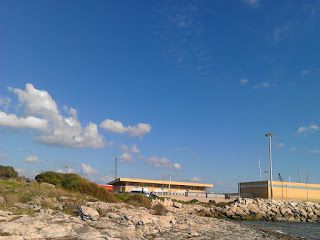What conditions are the asylum seekers actually living in at the Mineo megaCARA (Hosting Centre for Asylum Seekers)?
After months of complete indifference, in the last few weeks the media have started to acknowledge the Mineo CARA and articles are being published which speak apologetically about the structure of “excellence at a European level.”
Between the 10th May and the 27th July last year a succession of 4 riots took place in an attempt to speed up the process of requests for asylum (the first hearing took place more than 2 months after the arrival of the 1,600 asylum seekers and straight after the first riot). There have been no substantial changes in the situation since last year.
—The situation regarding the time taken to process requests for asylum has worsened since last September. There is just one Commission operating which manages to get through 30-40 cases a week. Whilst during last summer, the number was at least the double. Furthermore, the number of complaints against corrupt interpreters asking for money in order to “soften up” the Commission continues and almost all of the asylum seekers have denounced the poor service provided by the interpreters, which in some cases contributes to rejection (more than 50% of cases result in rejection).
—Living conditions under the new management, the consortium Sisifo (confirmed for all of 2012), have to some extent changed compared with the previous militarisation of daily life under the former management, the Red Cross (who ran the site until 16th October 2011); the unending queues have been reduced, but it is still forbidden to cook within the houses (it is not only the kitchens which have been dismantled for security reasons, but also the external barbecues which are prohibited). This also means, however, that the management company’s catering business is kept alive and well (worth around €10 per head per day) with dishes that continue to provoke numerous cases of gastro- intestinal disturbances. With a lot less, the asylum seekers could cater for themselves according to their own traditions and diet. Moreover, reports of random checks carried out by the military outside the camp to confiscate food which “could” be cooked from being brought into the Centre continue.
— Transport connections to Mineo and other nearby towns are a problem. Yet in the past migrants were asked the shameful sum of €2 for a return ticket to Mineo, when at the time, they received no daily allowance (for a good six months from March to October, the then CARA management provided no allowance whatsoever, even for the process of obtaining their permit of stay -saving money at the expense of the asylum seekers’ poverty). In the past couple of months, a free bus service has been set up. There are 50 places available for one return journey which runs only in the morning. This means the vast majority of the residents go to and from Mineo (11km) on foot.
Even though it is months now that the migrants have suspended their protests, it doesn’t mean that they are satisfied to stay parked indefinitely in a luxury concentration camp. As a consequence of the protests about a hundred residents were “voluntarily” transferred to other Centres last August. (How come a private village built by Pizzarotti di Parma, for which the construction company receives approximately €6 million annually, was chosen as suitable accommodation?). Exploitation of the North African emergency of last year (for which the daily contributions were doubled compared to the SPRAR [System of Protection for Asylum Seekers and Refugees] project), which saw migrants coming from Tunisia and escaping the war in Lybia, is unfortunately only leading to the proliferation of other disastrous and nepotistic experiences of miniCARA and CDA (Hosting Centre) (often run by incompetent personnel, interested only in the business aspect of things). The asylum seekers would like to distance themselves from such structures in the hope of finding themselves better off in the Mineo megaCARA.
Currently at the Mineo CARA, there are over 1,900 migrants. The majority of them are either in the process of appealing against the rejections for asylum they have received or they have already received their permit of stay, international protection or humanitarian protection for months now. Often rejections do not recognise that the asylum seeker has come from Lybia, taking into consideration only their country of birth. The consequences of this is that thousands of asylum seekers find themselves held hostage in an Italy of the inhumane politics of the ex-minister Maroni’s “war against migrants”. The current government, following on from the previous one, continues to use huge public resources (in times of ferocious social spending cuts) for sadistic segregationist politics not only in the CIEs, but also in the CARAs and CDAs. Lampedusa is still irresponsibly being declared an “unsafe port” and after the winter, the rescue operations at sea have resumed with the first dead bodies being recovered from the sea. After the promise brought about by the Arab Spring and the tragedy of the neo-colonial war in Lybia last year, we are making an appeal to support the petition for the right of a permit of stay for all asylum seekers arriving from Lybia (http:www.meltingpot.org/articolo17149.html) and to relaunch the mobilisation of support for their “right of choice” to build a future free from war and racism.
Catania Anti-Racist Network

